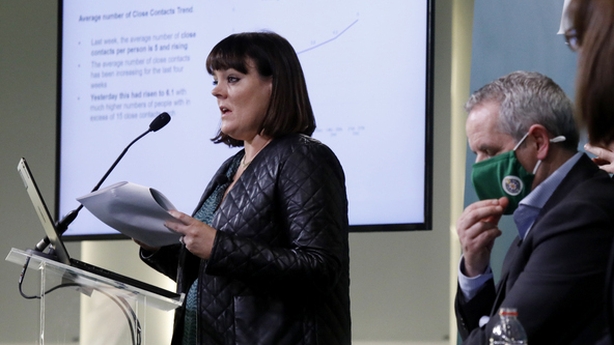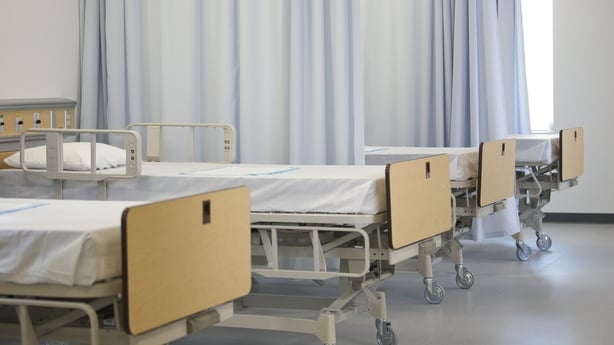The HSE's National Lead for Testing and Tracing has said they have seen a 41% rise in the demand for Covid-19 testing, with 63,000 referrals seen over the past week.
Speaking at a HSE briefing this afternoon, Niamh O'Beirne said they expect to see that number double next week, as it is sharply increasing at the moment.
She said this means that they expect to see swabbing sites around the country "maxing out at their daily capacity for testing".
Ms O'Beirne said trends indicate in the coming days that they could be looking at 25,000 per day for several days.
She said the largest number of referrals are coming from the 21-30 age group, which she said also has the highest virus detection rate at 8.9%.

She said this was followed by the 31-40 age group which accounted for 18.5% of all testing referrals, which had a detection rate of 7.6%.
There has been an increase of 129% in the number of contact tracing calls made in the past week, which Ms O'Beirne said will rise in the weeks ahead.
She said yesterday they made just under 13,000 calls.
HSE Chief Executive Paul Reid told the briefing that at this point, the benefit of what the public does as a whole does "far outweighs" the role of what testing and tracing can do.
He said we are at a stage now where the situation is "beyond any capacity that you could build to keep following" it.
"You could keep building capacity, but with the transmission levels that are in the community, you would never catch it," he said.
He added the next big driver to bring down transmission is the public's own actions.
Mr Reid also said that most of the body's worst concerns from before Christmas have now been realised.
He said there was now "an unprecedented and toxic combination of potential scenarios" which have been realised and have emerged.
Speaking at the HSE briefing, @paulreiddublin says the Covid-19 situation right now in the country is "very alarming and is high risk". | Read more: https://t.co/hFfTLB6R41 pic.twitter.com/zuEljvtC7c
— RTÉ News (@rtenews) December 30, 2020
Mr Reid said this was a combination of "a massively high level and rapidly growing daily cases", combined with test positivity levels that have not been seen in a long time.
He said this was demonstrating a "very dangerous level of transmission of the virus", and added that there were now "extreme levels" in terms numbers of the number of people's close contacts.
Mr Reid said: "We are seeing much of our worst concerns have now materialised themselves."
Also speaking at the briefing, HSE Chief Clinical Officer Dr Colm Henry said the reproductive number now stands at 1.8.
He said getting the R number below 1 would now take an enormous national effort.
Dr Henry said even if we managed to get the R number down to 1.4, this would still translate into 2,000 cases per day by mid-January, and perhaps 3,000 per day by the end of January.
He said the corresponding number in hospitals at that stage could be as high as 800.
Speaking at the HSE briefing, Dr Colm Henry said "it is unthinkable that we are going to be able to maintain an R value of 1.8." | Read more: https://t.co/hFfTLB6R41 pic.twitter.com/QhSkPanvxf
— RTÉ News (@rtenews) December 30, 2020
Dr Henry said in primary care they are seeing a "very significant" number in calls and referrals in relation to Covid-19, with over 25,000 community referrals yesterday, of which 15,000 were symptomatic referrals from GPs.
Dr Henry said there was now widespread community transmission, with a 5-day average of over 1,200, adding that we are now "entering a serious phase of escalation of Covid-19 in this country".
He said the 14-day incidence is 273 and rising across all age groups, adding that the increases were occurring in all counties.
Dr Henry said the number of close contacts was now rising daily and now stands at an average of six per confirmed case.
Paul Reid thanked all of their healthcare teams who have worked "relentlessly" over the festive period, some of whom had to be called back from annual leave due to the level of cases and testing they are facing.
He issued "a very serious and urgent call" on behalf of the HSE to the public, saying the situation at the moment was "very alarming and high risk".
Mr Reid said there was also "very real concern" around the lag effect, and what number of cases may emerge next week based off the high number of tests they have processed in recent days.
"We are seeing increasing levels of outbreaks, not at any alarming level just now, but we were probably dealing with 6-10 in the week leading up to Christmas," he said, adding that their key concern at the moment was the level of community transmission.
Read the lastest coronavirus stories
He said: "We're all extremely high risk in many parts of the country... the transmission levels are at quite a worrying level across the community. So I call on everybody to really take immediate actions regardless of what decisions are made later by Government.
"We need everybody to take immediate and urgent reactions. Withdraw from any plans, arrangements, activities we may have had and really do protect yourself".
He said the rising number of Covid-19 hospitalisations was a matter of "extreme concern", adding that there has been "a very significant step-up" in overall services activity in the last three days.
Mr Reid said coronavirus cases in hospitals have a very disproportionate impact compared to normal hospitalisations, as with Covid-19 cases, beds and in some cases wards, are lost.
He said "hospitals are coping", but know they will be under increasing pressure in the coming weeks.
As of this morning there were 454 patients in hospital, with 39 in intensive care.
Mr Reid said there were 650 available beds, but this has declined in recent days, adding that there are 55 critical care beds available.
He added the HSE has not yet seen any similar impact that other countries have seen in terms of the late arrival of vaccine doses.

Mr Reid said almost half of the new cases being seen over the past two weeks are among the 19-44 age groups, and that the number of contact tracing calls have risen by 300% in the past few weeks.
He said the highest incidence rate per 100,000 people was seen through 19-24 year-olds at 496.1, followed 25-44 year-olds at 340.5 per 100,000 people.
10% of new cases in recent weeks are among people over the age of 65, he said, adding that community referrals for tests have risen by 64-65%.
He said cases are rising, and test positivity rates are averaging at 10% at the moment, which he said were "very serious".
He said the number of new cases was growing at an "exponential rate", with yesterday's figures exceeding peaks during the previous surges of the virus.
Mr Reid also said there is now a further 32,000 doses of the vaccine secured in cold chain storage.

